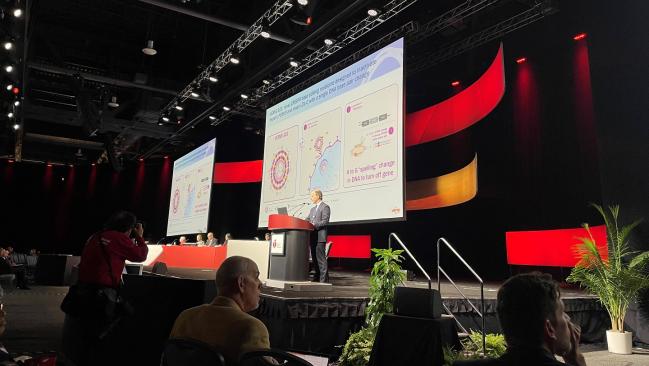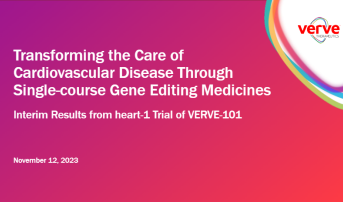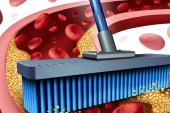Gene Editing Shuts Off PCSK9 to Lower LDL in HeFH
Early data raise hopes for VERVE-101 being a durable answer to treating the lifelong disorder, but safety remains to be seen.

PHILADELPHIA, PA—For high-risk patients with heterozygous familial hypercholesterolemia (HeFH), a novel therapy that shuts off the PCSK9 gene can lower LDL cholesterol, early data from the heart-1 trial show.
The interim results, with up to 6-month follow-up for 10 patients given four different doses of VERVE-101 (Verve Therapeutics), also suggest the approach is safe in the short term.
Andrew M. Bellinger, MD, PhD, chief scientific officer for the company developing the therapy, presented the findings Sunday at the American Heart Association (AHA) 2023 Scientific Sessions and spoke to the breadth of HeFH’s reach. The genetic condition affects an estimated 3 million people in the US and Europe, who face a lifelong treatment regimen.
“The current care consists of daily pills and intermittent injections that must be taken for decades. This places a very heavy treatment burden on patients, providers, and the healthcare system. And under this model, very few patients reach goal, only 22% in the US and 3% globally. This chronic care model seems to be broken,” said Bellinger.
Approaching the problem from a different route—human genetics—could be a solution, he suggested. Some people already possess naturally occurring genetic variants that lead to lower LDL and lower risk of atherosclerotic cardiovascular disease (ASCVD), so “we asked the question: can we develop a single course treatment that mimics these naturally occurring variants and protects against ASCVD?”
The resulting product, VERVE-101, is a CRISPR base-editing medicine that works through a single DNA base-pair change to inactivate the PCSK9 gene in the liver, with the goal of reducing LDL cholesterol.
Karol Watson, MD, PhD (UCLA Health, Los Angeles, CA), commenting on the results for the press, described heart-1 as a “perfect proof-of-principle study” that shows gene editing can produce durable LDL-lowering. “This,” she stressed, “has never been done before.”
Watson asserted that amid the excitement, there also should be caution: “You are changing the genome forever. Safety is going to be of the utmost importance, especially because there are currently safe and efficacious strategies available for lipid-lowering. This is a strategy that could be revolutionary, but we have to make sure that it's safe.
“And regarding the outcomes, we just don't know,” she continued. “This is a first, early study. It shows that we could do this, but we'll have to see if it's safe and if there’s efficacy in terms of what we really care about—the cardiovascular outcomes.”
Both PCSK9 and LDL Levels Dropped
VERVE-101 is given as a onetime IV infusion. In the interim report from heart-1, three patients with HeFH received a 0.1-mg/kg dose of VERVE-101, three a 0.3-mg/kg dose, three a 0.45-mg/kg dose (one of which was lost to follow-up), and one a 0.6-mg/kg dose. All had established ASCVD and uncontrolled hypercholesterolemia and were on maximally tolerated oral lipid-lowering therapy. Mean age was 54 years, and 80% were male. The mean baseline LDL level was 193 mg/dL.
PCSK9 and LDL levels after treatment were reported as the time-weighted average from day 28 through last available follow-up.
This is a strategy that could be revolutionary, but we have to make sure that it's safe. Karol Watson
“At the first two dose levels, we saw a minimal effect of VERVE-101 on reduction in PCSK9 levels,” Bellinger said. “However, in the next two dose levels, 0.45 and 0.6, we saw a 47%, 59%, and 84% reduction in blood PCSK9 after a onetime infusion.”
Approximately 85% of serum PCSK9 is produced in the liver, he pointed out. “So in that individual, where we saw 84% [less] PCSK9, that suggests that we were able to edit the PCSK9 gene in nearly every hepatocyte, both copies of the gene, to turn off liver production of PCSK9.”
For LDL cholesterol, again the two lower doses had minimal effects. With the 0.45-mg/kg dose, one patient had a 39% decrease in LDL and the other a 48% decrease. With the 0.6-mg/dose, that individual saw a 55% reduction that was sustained through 180 days.
Safety data thus far are encouraging, said Bellinger. Four patients experienced an infusion-related reaction with VERVE-101, and three had an upper respiratory infection/COVID-19. The patient at the highest dose had grade 3 transaminitis but recovered without symptoms or intervention. Two patients experienced a cardiovascular event; these included a fatal cardiac arrest about 5 weeks after infusion (0.3-mg/kg dose) as well as an MI and nonsustained ventricular tachycardia (0.45-mg/kg dose). The cardiac arrest and nonsustained ventricular tachycardia were deemed unrelated to treatment, while the MI was "potentially related to treatment due to proximity to dosing," he reported.
Bellinger said next steps include continuing to enroll participants in the United Kingdom and New Zealand, expanding the study to the United States, and eventually conducting a placebo-controlled, randomized phase II trial.
From Research to the Real World
Cholesterol-lowering drugs, historically, are first studied in the FH setting before then moving on from that niche population to the wider world. It’s unclear whether the same might be possible for VERVE-101. At the moment, Bellinger told TCTMD, gene-editing therapy is most “ideal for patients who need decades of treatment, not necessarily the patient who is 69 and had a heart attack last week. We’re envisioning that this will ultimately be a treatment that could be applied earlier in the disease course to younger patients who have very high lifetime risks, but not necessarily high risk over the next year or two or even 10 years.”
Based on earlier concerns with viral vectors for CRISPR, US and European regulators are now requiring investigators to obtain 15 years of follow-up when testing gene-editing therapies, said Bellinger.
Here, with VERVE-101, “we don’t fundamentally believe that there is a long-term risk” inherent to inactivating the PCSK9 gene, he said. Even so, with gene editing more generally, there’s always the potential that the agent could inadvertently alter other parts of the genome and raise the risk of cancer.
“That's where we put 95% of our work as a company: is to demonstrate we do not induce structural arrangements, [that] we do not make edits elsewhere in the genome. And so we think that risk is very low. But ultimately, we will have to run those larger studies with observation for those outcomes of cancer incidence,” Bellinger acknowledged.
Gene-based therapies aren’t easily reversed, he acknowledged, but Bellinger did not envision this being necessary. This type of therapy is like “molecular surgery without a scalpel,” so to speak—less like a drug and more like a onetime intervention.
Donald Lloyd-Jones, MD (Northwestern University Feinberg School of Medicine, Chicago, IL), past president of the AHA, observed that PCSK9 is a “good initial target” for gene editing in that other methods to target it, like the PCSK9 inhibitors currently on the market, haven’t had ill-intended effects.
PCSK9 is “a protein that does one thing that we don’t really need it to do”—namely, interfering with the body’s processes to absorb LDL particles—"and doesn't seem to have many other mechanisms at all,” explained Lloyd-Jones, who moderated the AHA press conference. “The specificity of [VERVE-101] to that one site in the genome, we hope, is actually as specific as it looks to be. It should be, but I think only time will tell us.”
In the short term, inflammation could arise from the initial therapy, he added, though this would perhaps be less worrisome in a younger person without substantial atherosclerotic burden at the time of treatment.
“Ultimately, I think the dream for me as a clinician would be if I have a 20-year-old with significant heterozygous FH looking at a lifetime of taking a statin pill every single day or they could have an MI at age 32, you know, this might be something they'd really consider as an option,” Lloyd-Jones said.
“And so, if we get those safety data, if we get those efficacy data, I think this would be a very interesting approach to a lifetime fix. Now, they might still need other medications, for sure, because we don't know how long it'll last, or other things. But I think it’s a very, very interesting approach,” he commented.
To the press, Bellinger noted that the patients in heart-1 have continued to take their lipid-lowering medications.
Caitlin E. Cox is Executive Editor of TCTMD and Associate Director, Editorial Content at the Cardiovascular Research Foundation. She produces the…
Read Full BioSources
Bellinger AM. Safety and pharmacodynamic effects of VERVE-101, an investigational DNA base editing medicine designed to durably inactivate the PCSK9 gene and lower LDL cholesterol - interim results of the phase 1b heart-1 trial. Presented at: AHA 2023. November 12, 2023. Philadelphia, PA.
Disclosures
- Bellinger is an employee and equity holder of Verve Therapeutics.





Comments